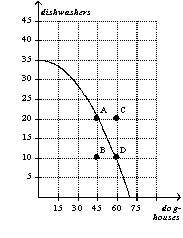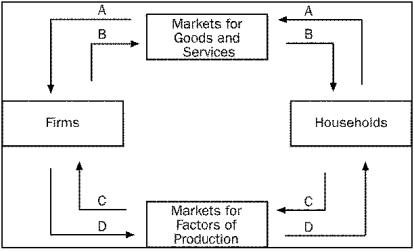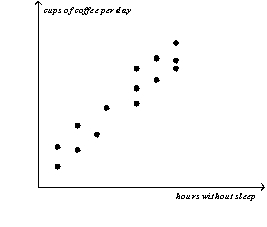A) the x-coordinate.
B) the y-coordinate.
C) the horizontal location of the point.
D) the slope.
Correct Answer

verified
Correct Answer
verified
Multiple Choice
One way to characterize the difference between positive statements and normative statements is as follows:
A) Positive statements tend to reflect optimism about the economy and its future, whereas normative statements tend to reflect pessimism about the economy and its future.
B) Positive statements offer descriptions of the way things are, whereas normative statements offer opinions on how things ought to be.
C) Positive statements involve advice on policy matters, whereas normative statements are supported by scientific theory and observation.
D) Economists outside of government tend to make normative statements, whereas government-employed economists tend to make positive statements.
Correct Answer

verified
Correct Answer
verified
True/False
Economists work both inside and outside the administrative branch of the U.S.government.
Correct Answer

verified
Correct Answer
verified
Multiple Choice
The y-coordinate is the
A) first number of an ordered pair and represents the point's horizontal location.
B) second number of an ordered pair and represents the point's horizontal location.
C) first number of an ordered pair and represents the point's vertical location.
D) second number of an ordered pair and represents the point's vertical location.
Correct Answer

verified
Correct Answer
verified
True/False
Figure 2-14
 -Refer to Figure 2-14.This economy fully employs its resources when it produces 35 dishwashers and zero doghouses.
-Refer to Figure 2-14.This economy fully employs its resources when it produces 35 dishwashers and zero doghouses.
Correct Answer

verified
Correct Answer
verified
Multiple Choice
Suppose an economy produces two goods,food and machines.This economy always operates on its production possibilities frontier.Last year,it produced 1000 units of food and 47 machines.This year,it is producing 1050 units of food and 52 machines.Which of the following events could not explain the increase in output?
A) a reduction in unemployment
B) an increase in available labor
C) an improvement in technology
D) Any of these events could explain the increase in output.
Correct Answer

verified
Correct Answer
verified
True/False
In the circular-flow diagram,one loop represents the flow of goods and services,and the other loop represents the flow of factors of production.
Correct Answer

verified
Correct Answer
verified
Multiple Choice
The Council of Economic Advisers
A) was created in 1946.
B) advises the president of the United States on economic policy matters.
C) writes the annual Economic Report of the President.
D) All of the above are correct.
Correct Answer

verified
Correct Answer
verified
Multiple Choice
Economists make assumptions to
A) provide issues for political discussion.
B) make a complex world easier to understand.
C) make it easier to teach economic concepts and analysis.
D) create policy alternatives that are incomplete or subject to criticism.
Correct Answer

verified
Correct Answer
verified
Multiple Choice
The art in scientific thinking -- whether in chemistry,economics,or biology -- is
A) the design and implementation of laboratory experiments.
B) knowing when to stop collecting data and when to start analyzing the data.
C) deciding which assumptions to make.
D) being able to mathematically model natural phenomena.
Correct Answer

verified
Correct Answer
verified
Multiple Choice
Economists hold many positions advising the president and Congress including
A) being a member of the Council of Economic Advisers.
B) helping to enforce antitrust laws at the Department of Justice.
C) conducting research at the Congressional Budget Office.
D) All of these are possible positions that economists hold.
Correct Answer

verified
Correct Answer
verified
Multiple Choice
Policies such as rent control and trade barriers persist in spite of the fact that economists are virtually united in their opposition to such policies,probably because
A) economists have not yet convinced the general public that the policies are undesirable.
B) economists engage in positive analysis, not normative analysis.
C) economists have values that are different from the values of most non-economists.
D) economists' theories are not easily confirmed or refuted in laboratory analysis.
Correct Answer

verified
Correct Answer
verified
Multiple Choice
An economy's production of two goods is efficient if
A) all members of society consume equal portions of the goods.
B) the goods are produced using only some of society's available resources.
C) it is impossible to produce more of one good without producing less of the other.
D) the opportunity cost of producing more of one good is zero.
Correct Answer

verified
Correct Answer
verified
Multiple Choice
"Prices rise when the quantity of money rises rapidly" is an example of a
A) negative economic statement.
B) positive economic statement.
C) normative economic statement.
D) statement that contradicts one of the basic principles of economics.
Correct Answer

verified
Correct Answer
verified
Multiple Choice
Figure 2-1
 -Refer to Figure 2-1.Which arrow represents the flow of spending by households?
-Refer to Figure 2-1.Which arrow represents the flow of spending by households?
A) A
B) B
C) C
D) D
Correct Answer

verified
Correct Answer
verified
True/False
The slope of a line is the ratio of the vertical distance covered to the horizontal distance covered along the line.
Correct Answer

verified
Correct Answer
verified
Multiple Choice
When economists make positive statements,they are
A) speaking as scientists.
B) speaking as policy advisers.
C) making claims about how the world should be.
D) revealing that they are very conservative in their views of how the world works.
Correct Answer

verified
Correct Answer
verified
Multiple Choice
President Truman once said the wanted to find a one-armed economist because when he asked his economists for advice,they always answered,"On the one hand,...On the other hand,..." Truman's observation that economists' advice is not always straightforward
A) is rooted in the principle that people face tradeoffs.
B) indicates that economists recognize that there are opportunity costs associated with policy decisions.
C) confirms that economists are not suited to be presidential advisers.
D) More than one of the above is correct.
Correct Answer

verified
Correct Answer
verified
Multiple Choice
Figure 2-13
 -Refer to Figure 2-13.Taking cause and effect into account,which of the following interpretations would be most reasonable regarding the relationship between coffee and hours without sleep?
-Refer to Figure 2-13.Taking cause and effect into account,which of the following interpretations would be most reasonable regarding the relationship between coffee and hours without sleep?
A) The less coffee a person drinks per day, the more time he can go without sleep.
B) There is no relationship between how much coffee per day a person drinks and how long he can go without sleep.
C) The more coffee a person drinks per day, the more time he can go without sleep.
D) The more coffee a person drinks per day, the less time he can go without sleep.
Correct Answer

verified
Correct Answer
verified
Multiple Choice
A normative economic statement such as "The minimum wage should be abolished"
A) would likely be made by an economist acting as a scientist.
B) would require values and data in order to be evaluated.
C) would require data but not values in order to be evaluated.
D) could not be evaluated by economists acting as policy advisers.
Correct Answer

verified
Correct Answer
verified
Showing 81 - 100 of 535
Related Exams